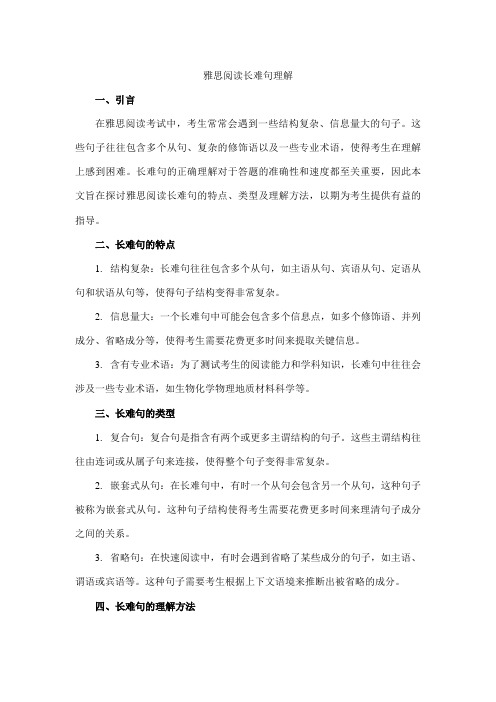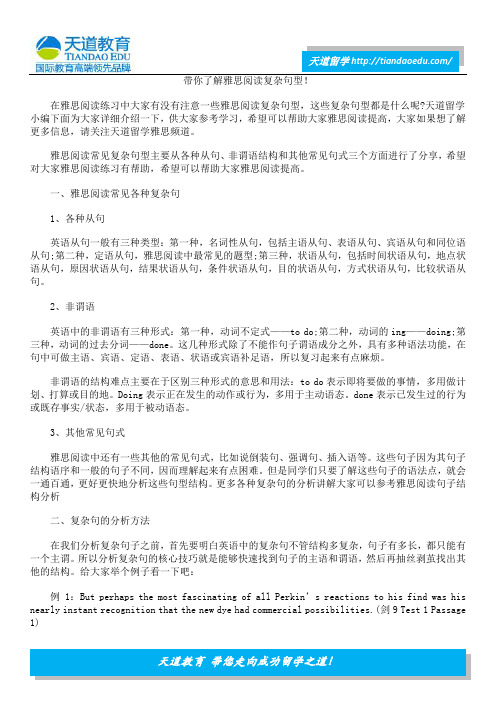雅思阅读中常见特殊句式整理和句型特点总结
Aalvtzm雅思阅读高频考点句式特征

生命是永恒不断的创造,因为在它内部蕴含着过剩的精力,它不断流溢,越出时间和空间的界限,它不停地追求,以形形色色的自我表现的形式表现出来。
--泰戈尔雅思阅读高频考点句式特征1 定语从句:考主句:The rise of dictionaries is associated with the rise of the English middle class, who were anxious to define and circumscribe the various worlds to conquer—lexical as well as social and commercial.考从句:James Boswell described the garret where Johnson worked as ‘fitted up like a counting house’with a long desk running down the middle at which the copying clerks would work standing up.He was helped by six assistants, two of whom died whilst the dictionary was still in preparation.It is the cornerstone of English, an achievement which conferred stability on the language of his country. (作文可用)2 并列句和动词连动并列句:He would write a dictionary himself; and he would do it single-handed.动词连动:The dictionary, together with his other writing, made Johnson famous and so well esteemed that his friends were able to p revail upon King George III to offer him a pension.By the age of three, the children in the programme were significantly more advanced in language development than their peers, had made greater strides in problem solving and other intellectual skills, and were further along in social development.从句并列:One’s first inclination might be to argue that there must be some sort of built-in animal aggression instinct that was activated by the experiment, and that Milgram’s teacher-subjects were just following a genetic need to discharge this pent-up primal urge onto pupil by administering the electrical shock. (宾语从句并列,第一个that 为考点)Even if America’s trash output continues to rise as it has done in the past, and even if the American population doubles by 2100, all the rubbish will still take up only one-12,000th of the ares.3.宾语从句Milgram told each volunteer ‘teacher-subject’that the experiment was in the noble cause of education, and was designed to test whether or not punishing pupils for their mistakes would have a positive effect on the pupil s’ ability to learn.(and 前后都是考点)The psychiatrists felt that ‘most subjects would not go beyond 150 volts’and they further anticipated that only four percent would go up to 300 volts. Furthermore, they thought that only a lunatic fringe of about one in 1000 would give the highest shock of 450 volts.(三个that均为考点)4 非谓语动词doing:The subject merges his unique personality with larger institutional structures, surrendering individual properties like loyalty, self-sacrifice and discipline to the service of malevolent systems of authority.Working to a deadline, he had to draw on the best of all previous dictionaries, and to make his work one of heroic synthesis.Done:Chimmpanzees have a play-face—a gaping expression accompanied by a panting noise.5状语从句:推理逻辑关系让步:Baekeland’s invention, although treated with disdain in its early years, went on to enjoy and unparalleled popularity which lasted throughout the first half of the twentieth century.Latin was suitable for an international audience of scholars, whereas English reached a socially wider, but more local audience.Despite substantial funding, results have been disappointing.原因:The writer Arthur Koestler dubbed it the luxury reflex: ‘unique in that it serves no apparent biological purpose.’In the 19th century, scientific English again enjoyed substantial lexical growth as the industrial revolution created the need for new technical vocabulary.Day length is an excellent cue, because it provides a perfectly predictable pattern of change within the year.偶考时间:Desert annual germinate, flower and seed whenever suitable rainfall occurs, regardless of the day length.6 主语从句:Whether a joke gives pleasure or pain depends on a person’s outlook.7同位语从句HAL thus encapsulated the optimism of the 1960s that intelligent computers would be widespread by 2001.8 虚拟语气考点:That would matter less if people applied the same degree of skepticism to environmental lobbying as they do to lobby groups in other fields.平行结构:(1)Most forms of environmental pollution either appear to have been exaggerated, or are transient and therefore best cured not by restricting economic growth, but by accelerating it.Graeme Ritchie understands not only humor but also language understanding and reasoning.Humans respond emotionally not only to their surroundings, but to their own thoughts as well.(2)First,…. Second,…(3)The expression provided an attractive but informative name for a research, cybernetics, logic and computer science.Many researchers align themselves with specific sub-disciplines such as neutral networks, agent technology, case-based reasoning, and so on.补充:短句式考点Most researchers agree that AI peaked around 1985.Fewer people are starving.特殊标点:破折号:Their system could be used to spot vehicles on a battlefield---tasks humans can do well.In particular, the problem of information overload, exacerbated by(非考点部分) the growth of e-mail means that there are plenty of opportunities for new technologies to help filter and categorise information—classic AI problems.注意:They found that minute crystals of nickel sulphide trapped inside the glass(非考点部分) had almost certainly caused the failure.。
雅思阅读五大常用句子结构剖析

雅思阅读五大常用句子结构剖析
1.主语+谓语+宾语
这是最基本的句子结构,用于表达主观事物或观点。
例如:I love reading books.(我喜欢读书。
)
2.主语+谓语+间接宾语+直接宾语
这种结构用于表达给予或传递其中一种信息或物品。
例如:She gave me a book.(她给了我一本书。
)
3.主语+谓语+宾语+宾补
这种结构用于表达主语的状态或特征。
例如:She was elected president.(她当选为总统。
)
4.主语+谓语+宾语+宾语补足语
这种结构用于表达主语使宾语成为其中一种状态。
例如:They made him happy.(他们使他快乐。
)
5.主语+连系动词+表语
这种结构用于表达主语的身份、状态或特征。
例如:She is a doctor.(她是一名医生。
)。
雅思阅读之常见的重点句型归纳总结

雅思阅读之常见的重点句型归纳总结1.强调句:强调某个特定的信息或观点,通常用“It is ... that ...”或“It is only ... which ...”等句型来表达。
例如:“It is only through cultural experience that one can truly understand the world in which they live.”2.倒装句:强调某个特定的信息或观点,通常用“... is it ... that ...”的句型来表达。
例如:“Only is it through cultural experience that one can truly understand the world in which they live.”3.比较句:用来描述两个事物的相同点和不同点,通常用“... as ...”或“... than ...”等句型来表达。
例如:“Cultural experience, as compared to cultural knowledge, plays a more important role in promoting cross-cultural understanding.”4.名词性从句:表达一个特定的观点或信息,通常用“What, Why, How, Whether ...”等引导的从句来表达。
例如:“What is important is not so much the knowledge one possesses but how one utilizes it.”5.条件句:表达一种假设情况,通常用“If ... were to do ...,then ...”或“If ..., would ..., then ...”等句型来表达。
例如:“If one were to travel to a foreign country, they would have to adapt to the new cultural environment.”掌握这些句型可以帮助考生更好地理解文章的主旨和细节,提高阅读速度和理解能力。
雅思阅读句子结构讲解

2.The way space is used to enable the individual to achieve privacy, to build homes or to design cities is culturally influenced.
2.The way space is used to enable the individual to achieve privacy, to build homes or to design cities is culturally influenced. 结构:本句有2个谓语动词,其中第二个is influenced是主句的谓语 动词,主干是The way is culturally influenced。第一个is used是定 语从句的谓语动词,但是该定语从句省略了引导词。定语从句中三 个并列的不定式短语动词to achieve privacy, to build homes or to design cities共同作为is used的目的状语。本句可以拆分为: 1) The way is culturally influenced. 2) Space is used to enable the individual to achieve privacy, to build homes or to design cities. 翻译:怎样利用空间来获得个人隐私、建造家园以及设计城市都会 受到文化的影响。
8. There are relay races in running and swimming in summer, and relay in skiing in winter.
雅思阅读长难句理解

雅思阅读长难句理解一、引言在雅思阅读考试中,考生常常会遇到一些结构复杂、信息量大的句子。
这些句子往往包含多个从句、复杂的修饰语以及一些专业术语,使得考生在理解上感到困难。
长难句的正确理解对于答题的准确性和速度都至关重要,因此本文旨在探讨雅思阅读长难句的特点、类型及理解方法,以期为考生提供有益的指导。
二、长难句的特点1.结构复杂:长难句往往包含多个从句,如主语从句、宾语从句、定语从句和状语从句等,使得句子结构变得非常复杂。
2.信息量大:一个长难句中可能会包含多个信息点,如多个修饰语、并列成分、省略成分等,使得考生需要花费更多时间来提取关键信息。
3.含有专业术语:为了测试考生的阅读能力和学科知识,长难句中往往会涉及一些专业术语,如生物化学物理地质材料科学等。
三、长难句的类型1.复合句:复合句是指含有两个或更多主谓结构的句子。
这些主谓结构往往由连词或从属子句来连接,使得整个句子变得非常复杂。
2.嵌套式从句:在长难句中,有时一个从句会包含另一个从句,这种句子被称为嵌套式从句。
这种句子结构使得考生需要花费更多时间来理清句子成分之间的关系。
3.省略句:在快速阅读中,有时会遇到省略了某些成分的句子,如主语、谓语或宾语等。
这种句子需要考生根据上下文语境来推断出被省略的成分。
四、长难句的理解方法1.抓住主干:在分析长难句时,首先要抓住句子的主干,即主语、谓语和宾语。
明确句子的主要结构和信息中心。
2.识别从句:从句是长难句中的重要组成部分,通过识别不同类型的从句(如定语从句、状语从句等),可以更好地理解句子结构。
3.利用上下文语境:在理解长难句时,要充分利用上下文语境的提示,推断出被省略的成分或理解复杂修饰语的含义。
4.提炼关键词:在长难句中寻找关键词,如动词、名词、形容词等,这些关键词通常能帮助考生理解整个句子的意义。
5.拆分长难句:对于一些特别复杂的长难句,可以尝试将其拆分成多个短句或分句,以便更好地理解和分析。
雅思常用语法总结

雅思常用语法总结雅思考试中常用的语法总结如下:1. 时态:包括一般现在时、一般过去时、现在进行时、过去进行时、将来时、过去将来时等。
时态的正确使用是非常重要的,特别是在写作和口语表达中。
2. 被动语态:被动语态用于强调动作的接受者和动作的重要性。
被动语态的形式为“助动词be + 过去分词”,常用的助动词有am, is, are, was, were等。
3. 条件句:条件句用于表达假设、可能性、推测等。
包括三种类型:零条件句(零条件句表示一般事实)、一般条件句(表示现在或将来的情况)、虚拟条件句(表示与现实相反的假设或不可能实现的情况)。
4. 从句:从句是一个句子中的一部分,具有主语和谓语,可做其他句子的主语、宾语、状语等。
常见的从句包括名词性从句(作主语、宾语、表语等)、定语从句(修饰名词)、副词从句(修饰动词、形容词、副词等)。
5. 并列结构:并列结构用于连接两个或多个相同重要性的句子,可以使用连词and, but, or等。
并列结构使句子更加流畅和有逻辑性。
6. 符合最佳用法:在雅思写作中,使用符合最佳用法是非常重要的。
这包括使用适当的连接词、平衡句子结构和长度、使用多样的句型和长句,并在表达观点时提供足够的支持和证据。
7. 倒装句:倒装句的语序颠倒是为了强调特定的信息或实现平衡和连贯。
常见的倒装情况包括完全倒装(谓语动词位于主语之前)、部分倒装(助动词位于主语之前)和否定倒装(否定词位于句首)。
8. 间接引语:间接引语用于转述别人的话或思想。
常见的引述动词包括say, tell, ask等。
在使用间接引语时,需要注意时态的转换和引号的使用。
这些是雅思考试中常用的语法要点总结,合理运用这些语法规则可以提高语言表达的准确性和流利度。
同时,还需要多加练习,掌握常用的语法用法。
带你了解雅思阅读复杂句型!

带你了解雅思阅读复杂句型!在雅思阅读练习中大家有没有注意一些雅思阅读复杂句型,这些复杂句型都是什么呢?天道留学小编下面为大家详细介绍一下,供大家参考学习,希望可以帮助大家雅思阅读提高,大家如果想了解更多信息,请关注天道留学雅思频道。
雅思阅读常见复杂句型主要从各种从句、非谓语结构和其他常见句式三个方面进行了分享,希望对大家雅思阅读练习有帮助,希望可以帮助大家雅思阅读提高。
一、雅思阅读常见各种复杂句1、各种从句英语从句一般有三种类型:第一种,名词性从句,包括主语从句、表语从句、宾语从句和同位语从句;第二种,定语从句,雅思阅读中最常见的题型;第三种,状语从句,包括时间状语从句,地点状语从句,原因状语从句,结果状语从句,条件状语从句,目的状语从句,方式状语从句,比较状语从句。
2、非谓语英语中的非谓语有三种形式:第一种,动词不定式——to do;第二种,动词的ing——doing;第三种,动词的过去分词——done。
这几种形式除了不能作句子谓语成分之外,具有多种语法功能,在句中可做主语、宾语、定语、表语、状语或宾语补足语,所以复习起来有点麻烦。
非谓语的结构难点主要在于区别三种形式的意思和用法:to do表示即将要做的事情,多用做计划、打算或目的地。
Doing表示正在发生的动作或行为,多用于主动语态。
done表示已发生过的行为或既存事实/状态,多用于被动语态。
3、其他常见句式雅思阅读中还有一些其他的常见句式,比如说倒装句、强调句、插入语等。
这些句子因为其句子结构语序和一般的句子不同,因而理解起来有点困难。
但是同学们只要了解这些句子的语法点,就会一通百通,更好更快地分析这些句型结构。
更多各种复杂句的分析讲解大家可以参考雅思阅读句子结构分析二、复杂句的分析方法在我们分析复杂句子之前,首先要明白英语中的复杂句不管结构多复杂,句子有多长,都只能有一个主谓。
所以分析复杂句的核心技巧就是能够快速找到句子的主语和谓语,然后再抽丝剥茧找出其他的结构。
雅思阅读句子结构讲解

雅思阅读句子结构讲解
雅思阅读部分包括三篇文章,每篇文章通常由3个段落组成。
以下是
一些常见的句子结构和解释:
1.主谓结构:句子由一个主语和一个谓语组成。
主语是句子中的主要
主题,谓语表示主语的动作或状态。
例子:Cats sleep.(猫睡觉)
2.主谓宾结构:句子由一个主语、一个谓语和一个宾语组成。
宾语是
主语动作的接受者或影响者。
例子:I like ice cream.(我喜欢冰淇淋)
3.并列结构:句子中有两个或多个并列的成分,这些成分用连词连接,可以是并列的主语、谓语、宾语等。
例子:She is tall and beautiful.(她又高又漂亮)
4.从句结构:一个从句是一个句子中的一个完整子句,它包含一个主
语和一个谓语,通常由连接词引导。
例子:I will go to the party if I am free.(如果我有空,我会
去参加派对)
5.倒装结构:在英语中,主语和谓语动词可以互换位置。
这种结构通
常用于强调一些成分或表示其中一种感情。
例子:Never have I seen such a beautiful sunset.(我从来没有
见过如此美丽的日落)
6.并列从句结构:句子中有两个或多个并列的从句,这些从句可以用连词连接。
例子:He said he was tired and that he wanted to go home.(他说他累了,他想回家)
希望这些句子结构的解释能对您有所帮助,加油!。
- 1、下载文档前请自行甄别文档内容的完整性,平台不提供额外的编辑、内容补充、找答案等附加服务。
- 2、"仅部分预览"的文档,不可在线预览部分如存在完整性等问题,可反馈申请退款(可完整预览的文档不适用该条件!)。
- 3、如文档侵犯您的权益,请联系客服反馈,我们会尽快为您处理(人工客服工作时间:9:00-18:30)。
雅思阅读中常见特殊句式整理和句型特点总结雅思阅读以说明文为主,多是肯定、客观的表达方式。
因此在陈述重点内容时势必会用到特殊的表达方式。
下面我们就集中讲解下雅思阅读中会用到哪些特殊句式。
我们都知道,在做雅思阅读时,把握主旨和段落大意是非常重要的,但是想提高我们的英语阅读理解能力及做题正确率,仅仅有这些信息是不足矣的,在雅思阅读的40道题目中,80%的题目都会涉及到文章细节内容,因此,把握文中的重要细节信息就非常重要了。
我们在阅读文章时会发现,作者在点明主旨后会在后面的阐述中进一步细说论据,而这些就是考题中常常涉及的细节内容,这也正是我们考生最头疼的地方,即在这繁杂的信息中,如何准确把握作者想要表达的重点。
1.转折:转折词汇后面的内容往往是作者想要表达的重点。
试想,我们在评论了别人的表现时,若说了一个“但是”,那后面的内容是否是最引起听者兴趣的地方?同理,雅思阅读中亦然。
常见的转折英语词汇有:but、however、despite、in spite of、although、though、yet(用语句首,表示尽管、虽然之意)、while(有尽管之意,不多见,同学们应注意)等。
2.否定:否定句在雅思阅读的说明文体中并不多见,因此,否定句、双重否定句是阐述重点内容的一个重点句式,如:not…but…;not…without…。
3.因果:因果逻辑是雅思文章中最常见也是最重要的逻辑关系之一。
因此,这是把握重要细节内容的重点之一。
相关词汇有:because、so、since(表原因)、as(表原因)、lead to、cause、result in、as a result of、as a result、therefore等。
4.强调句式:it is...that/who/why...及What引导的主语从句,如what makes it bad is...,what we need is...这样的句式本身就有强调的含义,因此作者使用这种句式时一定在重点说明某些内容。
5.步骤:步骤的描述很多情况下也是设置考点的地方。
在进行步骤描述时常会用到firstly、secondly等序数词(注意:initially是最初的意思,常同first互换);除序数词外,也会用到next、then、finally等词。
同时,应注意表示步骤的词汇有process、procedure、stage等词。
6.比较:比较也是重点内容之一,比较无非对比不同与相似,表达不同的词汇有:different、distinction、differ等;表达相似的词汇有:similarity、resemble、similar、resemblance、like(像的意思)等。
另外,表达比较时,常会用到:compare、compared with、in comparison、by contrast、on contrary等。
7.绝对性说法:因为雅思阅读的阐述方式是客观,因此一旦出现绝对性的说法,很有可能会是考点。
常见的绝对性词汇有:never、only(sole、alone常与这词互换)、must、mustn’t、always等。
8.定义式和结论性表述:所谓定义式表述就是作者在给出定义、阐述常识和某些真理时用到的表达方式;结论性表述是指作者在描述完某些项目或实验研究等后,得出的结论性东西,常用到的词汇有:therefore、conclude、in conclusion、the key for...is...等。
以上8点是作者在阐述重点内容时会用到的特殊句式,考生在平时做题及考试中可参考这些方面,帮助自己准确把握重点信息。
此外,雅思阅读还有一个“设铺垫”的特点,即作者在表达某一重点内容前会说些不重点的内容,通过与其或某些连接词来为后面的key point 做伏笔,常用到的连词多是转折、递进的词汇。
这一点,考生在阅读时也应注意。
我们以下面这篇文章为例。
Lost for wordsMany minority languages are on the danger list In the Native American Navajo nation which sprawls across four states in the American south-west,the native language is dying.Most of its speakers are middle-age or elderly.Although many students take classes in Navajo,the schools are run in English.Street sign,supermarket goods and even their own newspaper are all in English.Not surprisingly,linguists doubt that any native speakers of Navajo will remain in a hundred years’time.Navajo is far from alone.Half the world’s6,800languages are likely to vanish within two generations-that’s one language lost every ten days.Never before has the planet’s linguistic diversity shrunk at such a pace.“At the moment,we are heading for about three or four languages dominating the world”,says Mark Pagel,an evolutionary biologist at the University of Reading.“It’s a mass extinction,and whether we will ever rebound from the lost is difficult to know.Isolation breeds linguistic diversity as a result,the world is peppered with languages spoken by only a few people.Only250language have more than a million speaker,and at least3,000have fewer than2,500.It is not necessarily these small languages that are about to disappear.Navajo is considered endangered despite having150,000speakers.What makes a language endangered is not that the number of speakers,but how old they are.If it is spoken by children it is relatively safe.The critically endangered languages are those that are only spoken by the elderly,according to Michael Krauss,director of the Alassk Native Language Center,in Fairblanks.Why do people reject the language of their parent?It begins with a crisis of confidence,when a small community find itself alongside a larger,wealthier society,says Nicholas Ostler of Britain’s Foundation for Endangered Languages,in Bath.‘People lose faith in their culture’he say.‘When the next generation reaches their teens,they might not want to be induced into the old tradition.’The change is not always voluntary.Quite often,governments try to kill off a minority language by banning its use in public or discouraging its use in school,all to promote national unity.The former US policy of running Indian reservation in English,for example,effectively put languages such as Navajo on the danger list.But Salikoko Mufwene,who chairs the Linguistics Department at the University of Chicago,argues that the deadliest weapon is not government policy but economic globalisation.‘Native Americans have not lost pride in their language,but they havehad to adapt to socioeconomic pressures’he say.‘They cannot refuse to speak English if most commercial activity is in English".But are languages worth saving?At the very least,there is a loss of data for the study of languages and their evolution,which relies on comparisons between languages,both living and dead.When an unwritten and unrecorded language disappears,it is lost to science.Language is also intimately bond up with culture,so it may be difficult to reserve one without the other.‘If a person shifts from Navajo to English,they lose something'Mufwene says.‘Moreover,the loss of diversity may also deprive us of different ways of looking at the world’say Pagel.There is mounting evidence that learning a language produces physiological changes in brain.‘Your brain and mine are difference from the brain of someone,who speaks French,for instance’Pagel says,and this could affect our thoughts and perceptions.‘The patterns and connections we make among various concepts may be structured by the linguistic habits of our community.’So despite linguists’best efforts,many languages will disappear over the next century.But a growing interest in cultural identity may prevent the direst predictions from coming true.‘The key to fostering diversity is for people to learn their ancestral tongue,as well as the dominant language’says Doug Whalen,founder and president of the Endangered Language Fund in New Haven,Connecticut.‘Most of these languages will not survive without a large degree of bilingualism’he says.In New Zealand,classes for children have slowed the erosion of Maori and rekindled interest in the language.A similar approach in Hawaii has produce about8000new speakers of Polynesian languages in the past few years.In California,‘apprentice’programmes have provided life support to several indigenous languages.Volunteer'apprentices'pair up with one of the last living speakers of Native American tongue to learn traditional skill such as basket weaving,with instruction exclusively in the endangered language.After about300hours of training they are generally sufficiently fluent to transmit the language to next generation.But Mufwene says that preventing a language dying out is not the same as giving it new life by using every day.‘Preserving a language is more likely preserving fruits in a jar’he says. However,preservation can bring a language back from the dead.There are examples of languages that have survived in written form and then been revived by latter generations.But a written form is essential for this,so the mere possibility of revival has led many speakers of endangered languages to develop systems of writing where none existed before.分析:第三段Isolation breeds linguistic diversity这句话是典型的定义式句式,因此这是一个重要信息。
